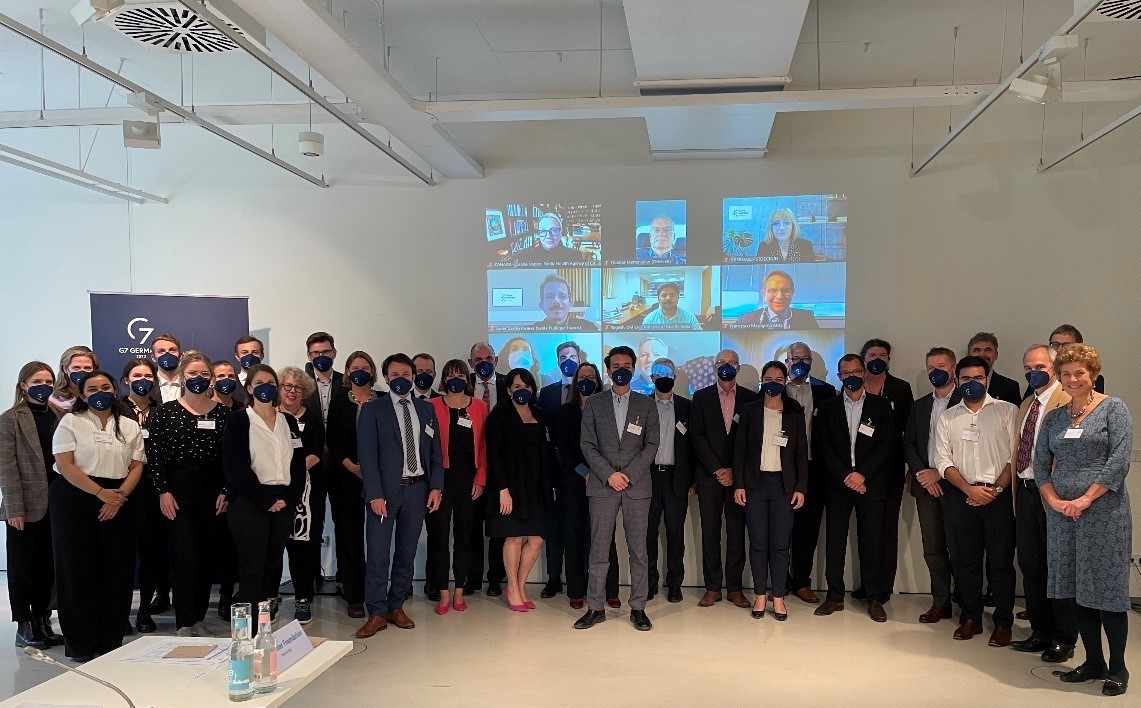G7 Invites IANPHI to Contribute to Two Technical Meetings in line with its Pact for Pandemic Readiness
IANPHI, represented by Public Health Wales and the Norwegian Institute of Public Health, participated in technical meetings of the G7 on public health emergency workforce and on collaborative surveillance, held respectively in Berlin and Geneva in October 2022.

Participants at the G7 technical meeting on collaborative surveillance in Berlin
G7 Technical Meeting on Collaborative Surveillance
On October 12-13, 2022 the G7 held a technical meeting on collaborative surveillance in Berlin at the request of G7 health ministers. The overall aim of the meeting was to provide input on collaborative surveillance that could be incorporated into a general roadmap for cooperation. The roadmap could include suggested priorities for G7 activities, e.g., as part of the support to at least 100 low- and middle-income countries for implementing International Health Regulations core capacities.
Several G7 countries were represented by their National Public Health Institutes (NPHIs) at the meeting. Other attendees included representatives from India and Indonesia from the G20, WHO and other key UN organizations, the European Union, the European Centre for Disease Prevention and Control, the Africa Centres for Disease Control and Prevention, philanthropic donors, and other organizations – including IANPHI.
Dr. Bjørn Iversen, senior medical officer at the Norwegian Institute of Public Health, gave a presentation on behalf of IANPHI and participated in the discussion. Dr. Iversen introduced IANPHI as the voice of NPHIs in the global community. NPHIs are uniquely positioned, he explained, being a part of – or closely associated with – their national government and, at the same time, being perceived by most as a politically impartial knowledge provider and being the main national actor responsible for health surveillance. Many speakers spoke about the important role of NPHIs in collaborative surveillance and of IANPHI as a network organization coordinating activities between NPHIs. Other important topics in the discussion included One Health (integrating surveillance of human and animal health, food and environmental), open-source systems and data sharing.
G7 Technical Meeting on the Public Health Emergency Workforce for Predictable Rapid Response
On October 14-15, 2022, the G7 held a second technical meeting, this time on the public health emergency workforce and in Berlin, to further develop the G7 Pact for Pandemic Readiness, which adopted in May 2022. The overall aim of the meeting, as requested by G7 Health Ministers, was to identify the ways and means of strengthening the health emergency workforce as a network. It recognized the potential of G7 countries to lead by example and to assist low and medium-income countries (LMICs) in implementing core capacities for another five years, until 2027.
The technical meeting received presentations from each G7 country and international, regional organizations and other stakeholders, including the World Health Organization, GOARN, TEPHINET, the World Bank, the Bill & Melinda Gates Foundation, Africa CDC and IANPHI. Representatives from G20 countries, including India and Indonesia, were also in attendance. Breakout sessions were held to focus on: the national public health and emergency workforce, the national health emergency corps, and the blobal health emergency corps. Each session sought to identify strategies for G7 countries to support capacity to strengthening of the health emergency workforce, and the tangible support that the G7 can provide to achieve progress on the education, retention and financing of the health emergency workforce in LMICs.
IANPHI, represented by Prof. Fu Meng Khaw, National Director of Health Protection and Screening Services and Executive Medical Director at Public Health Wales, gave a presentation and participated in the discussion. A few of the G7 countries had also representation from their NPHIs at the meeting. Key messages from IANPHI included IANPHI being the voice of NPHIs to the global community; NPHIs’ key role in responding to public health emergencies; the recognized need to advocate for increasing investment to create a resilient response workforce; the utility of creating a common skills and competency framework to support workforce development and planning; build opportunities for LMICs to gain international deployment experience. At a national level, NPHIs can design an operating model appropriate for the nation’s context, clarify roles and responsibilities of key actors and build and develop in country capacity and capability.
The discussions acknowledged the need for nations to develop their health emergency workforce and ‘stress-test’ the system to understand what resources are required. There was a recognized role for G7 nations to commit to investing in this workforce and continue global collaboration. Moreover, it was clear that the workforce could not be developed and trained in isolation of system enablers, such as infrastructure support.